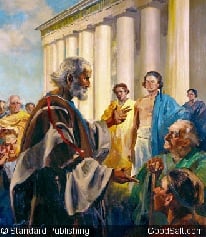Tuesday: Interlude in Athens
According to Acts 17:14-16, Silas and Timothy stayed in Berea while Paul was escorted to Athens. Paul instructed his escorts to have Silas and Timothy join him in Athens, but there is no mention of their doing so. On the other hand, in 1 Thessalonians 3:1, 2, we learn that Paul sent Timothy back to Thessalonica from Athens. So Timothy, at least, seems to have joined him there for a short time.
When speaking to Jews in Acts 17:2, 3, Paul begins with the theme of the Messiah in the Old Testament. When speaking to the pagan philosophers of Athens (Acts 17:16-34), where does he begin? What can we learn from these different approaches?
Paul does not simply enter Athens, march up to the Areopagus (known also as Mars Hill), and engage the philosophers there. He begins by spending some time walking around and making his own observations. He also engages the Jews of Athens and some of the Greeks in the synagogue there. Besides evangelizing to them in his customary way (see Acts 17:2, 3), he also would have been learning about the dominant culture in the city. The first step in any missionary effort is to listen and learn about the faith and world views of the people you are trying to reach.
Paul also spent time in the marketplace of Athens (which was below and within sight of the Areopagus, or Mars Hill), reasoning with anyone willing to talk with him. In the process he provoked the curiosity of some Epicurean and Stoic philosophers, who invited him to address them in the traditional place for such discussions.
He began his address to the intellectuals of Athens with observations about their city and religions. His theological beginning point was creation, a topic in which both he and they were interested. In contrast with his approach to the synagogue, he did not argue his case from Scripture but from writings with which they would have been familiar (Acts 17:27, 28 both echoes and quotes Greek writers). But when he stepped into territory that went beyond the boundaries of where they were intellectually comfortable, the philosophers seemed to have abruptly ended the discussion. A few individuals, however, continued to talk with Paul and became believers.
How well do we understand the worldviews and religious beliefs of those around us? Why is it important for us to have at least some knowledge of these things as we seek to witness?


I generally agree with the lesson author but also feel some clarification is needed. I believe that Paul didn’t do anything drastically different than what he did elsewhere. In Acts Luke says that, “he reasoned in the synagogue with the Jews and with the Gentile worshipers, and in the marketplace daily with those who happened to be there” (Acts 17:17 NKJV). I do not see this as being any different than what Paul did in Thessalonica where, “Paul, as his custom was, went in to them, and for three Sabbaths reasoned with them from the Scriptures” (Act 17:2 NKJV). Neither do I believe that we should assume that Paul did nothing during the week between those three Sabbaths (1 Thess 2:9; 2 Thess 3:7-8)?
I believe that during the week where ever he was he busied himself earning a living working at his trade of tent making (Acts 18:3; 1 Cor 4:12; Acts 20:34). While doing that he would be witnessing to his customers and fellow workers as he did in other places. Therefore, in my opinion Paul used the same approach in Athens that He used in all the other places; however, when he was asked to address a specific group of philosophers at their request he changed his approach in order to meet them where they were.
Paul’s strategy in every place was simple, to the Jews first then to the Gentiles (Rom 1:16; Acts 13:46; 1 Pet 4:17). He went to those with the greatest understanding first, then to those with far less knowledge after.
I believe Tyler has somewhat missed the point of the lesson. There was in fact a material difference in Paul’s approach, that is, whilst he reasoned with both groups, in the first instance he reasoned from the scriptures, whilst in the latter he reasoned from material or writing with which they would have been familiar. In other words, the point is that Paul took the time to discover their interests and to analyze their way of thinking and he used that to reason with them before going into the scripture. It was a strategy to gain their attention and invariably it was a successful strategy. The point being made is that as witnesses, we must understand the persons to whom we are speaking, otherwise we will never be effective in our ministry.
Whilst I appreciate Tyler’s thoughts, we should endeavour not to be distracted by less than important issues such as what Paul was doing in his first couple of weeks whether it be earning a living as a tent maker or otherwise…. there are critical points to be made regarding our approach in evenglism and we would do well not to miss them.
This lesson has made me realise the importance of not judging people, you first have to get to know them so you can decide on your approach in terms of witnessing to them.
I learned that as a Christian how polite we have to be with each other especially in evangelism. It is not only the word but as an individual and a child of God people should see God living within us and long for our Saviour.